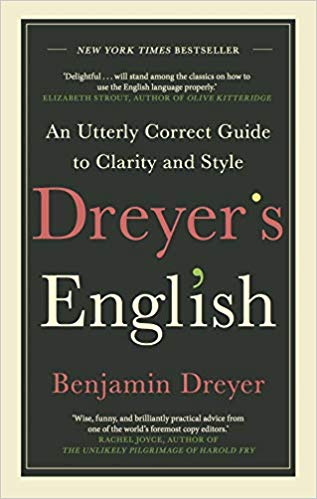Reference Books by Terry Freedman.jpg
Wend your way to the writing section of any half-decent bookshop, and you will find several books on the correct way to use English. I even have a few myself, as you can see from the photo. A brief perusal of the ones in the shop will persuade you that these tomes come in several categories:
Worthy and boring.
Worthy and interesting.
Worthy, interesting and humorous.
Boring.
Useless and boring.
Useless, boring and probably incorrect.
Useless, boring, incorrect and written by someone who has no particular authority in this area, unless speaking and writing in English are enough.
Until now, the only book I’ve found in the third category has been Collins’ Writing Guide. However, I now find myself having to add an eighth category:
Worthy, interesting, humorous and readable in the sense of making you want to read it from cover to cover.
The author, Benjamin Dreyer, has been a copy editor at Penguin Random House in the USA for a couple of decades. Just in case that mention of America puts you off, don’t allow it to: this is the UK edition.
The humour comes through right from the start, with the author speaking to the reader, in effect. This is especially the case in the footnotes, such as this one, occasioned by his allusion to working with a famous film director:
It’s not name-dropping if I don’t drop the name, right?
The footnotes are worth mentioning in themselves: they remind me of the essays of David Foster Wallace. Wallace even has footnotes within the footnotes, and so does Dreyer (once, I think, but that still counts).
It’s not just the humour that raises this book above the average, and makes sections such as the easily-confused words bearable. Being a copy editor, Dreyer suggests ways in which you can change your sentences to avoid certain words (such as “very”) or dreadful convolutions. Moreover, he isn’t a pedant in the sense of insisting on rules that were never rules (for English) in the first place, such as the non-splitting of infinitives.
I’m not sure about a couple of his injunctions though, the ones pertaining to the capitalisation of the first letter after a colon, and when to use single as opposed to double quotation marks. He may be theoretically correct, but different people and indeed different countries have different views. Ingrained habits are difficult to break.
Dreyer’s English is not the only style guide you will need — indeed, the author himself recommends a couple of standard books. However, it is one that you will find yourself reaching for to clarify something — or when you need a bit of light relief from your own literary efforts!
If you enjoyed this review, why not sign up to my newsletter, Terry Freedman’s Books Bulletin?

